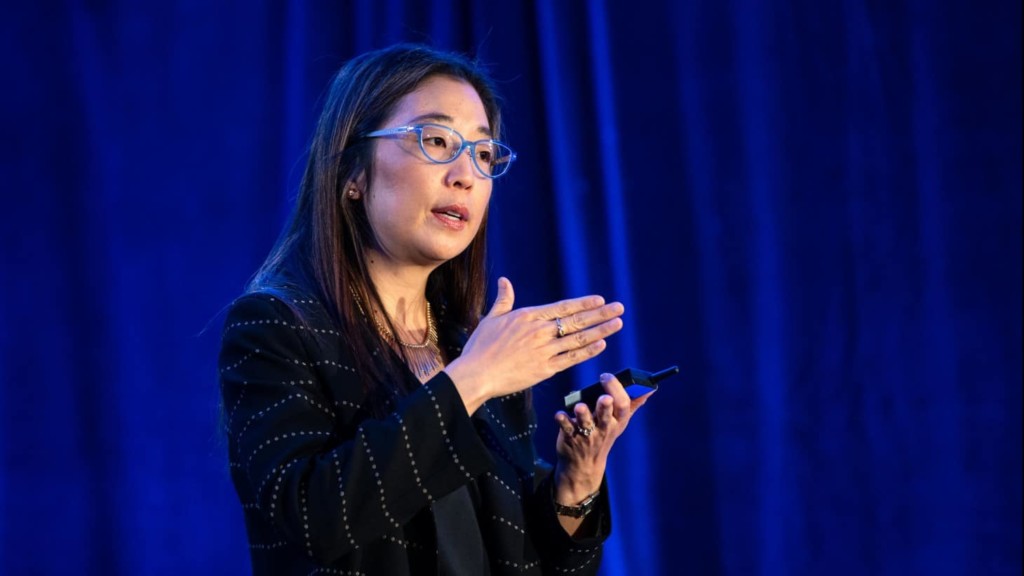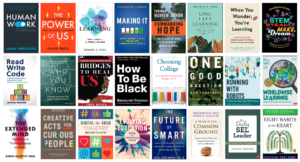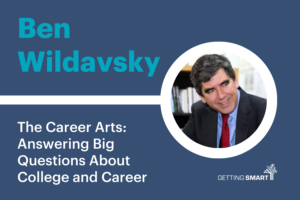Michelle Weise on Long Life Learning

On this episode of the Getting Smart Podcast, Tom sits down with author and advisor Michelle Weise to discuss her new book Long Life Learning: Preparing For Jobs that Don’t Even Exist Yet.
Michelle is currently serving as an Entrepreneur In Residence and Senior Advisor at Imaginable Futures, a venture of The Omidyar Group and was formerly the Chief Innovation Officer of Strada Education Network’s Institute for the Future of Work, and Sandbox Collaborative, the innovation center of Southern New Hampshire University. She also co-authored Hire Education: Mastery, Modularization, and the Workforce Revolution with Clayton Christensen.
In this conversation, Tom and Michelle discuss her background in the arts and innovation; how and why she came to write her new book, Long Life Learning; what long life learning means to her; what she predicts to be the future of business models for long life learning; and her advice on how we can all make good decisions about what to learn next no matter where we are on our long life learning journey.
On one of the most important lessons learned in her time at the Christensen institute: “It doesn’t matter the data you bring to the table if you cannot figure out a way to tell the story that captivates people.”
In response to the question, What are the business models for long life learning going to be? “We shouldn’t always be recruiting externally. [We should be asking] what talent do we have access to right now? They are not talking about solving for time, they are talking about solving for skills. The onus can’t be on the individual, employers need to carve out parts of the day. They used to train workers at least 2.5 weeks/year and now it’s not skill training, it’s behavioral training and far less time.” This leads to a discussion about time poverty.
Michelle also discusses one of the many benefits of AI in education, that you can coordinate with AI to discover and name competencies that were previously hidden. With this support, we can better envision pathways forward for ourselves.
On how to keep getting smarter: “Write a lot. I have to start pulling thoughts together on the page.”
Also, check out one of Michelle’s favorite Louise Glück poems.
Long Life Learning Book Summary:
Long Life Learning offers readers a fascinating glimpse into a future where the average working life has no beginning, middle, or end. Contemplating a shift from the educational all-you-can-eat buffet of college and university to an “as-you-need-it” approach to delivering education, author Michelle Weise explains why and how worker education is overdue for momentous changes.
Written in two parts, Long Life Learning begins by imagining a world where increased lifespans have contributed to creating working lives that span over 100 years. The book asks the question that naturally arises as a result: Will a four-year education taken at the beginning of a 100-year career adequately prepare a worker for their entire working life?
After providing readers a thorough explanation of why our current education system is poorly equipped to educate workers for such a long journey, Weise outlines the solutions to the shortcomings of the existing framework. From wraparound supports for workers to targeted education, integrated earning and learning, and transparent and fair hiring, Long Life Learning describes exactly how the existing education system must adapt in order to meet the needs of a new generation of workers. The book makes a compelling case for the coming need for ongoing, periodic education, as well as training that is seamlessly integrated into our future jobs.
Perfect for workers, young and old, and the educators and employers preparing talent as the ground shifts underneath their feet, Long Life Learning belongs on the bookshelves of anyone with an interest in the future of work, education, and the labor market.
Key Takeaways:
[:10] About today’s episode with Michelle Weise.
[:55] Tom Vander Ark welcomes Michelle to the podcast.
[1:37] When did Michelle’s interest in language, literature, and poetry begin?
[2:27] Michelle elaborates on her deep passion for poetry and how both reading and writing it helped her get through the death of her 10th-grade chemistry teacher.
[3:07] Michelle’s exploration of Asian-American and African-American poetry and fiction in graduate school.
[5:14] How and why Michelle came to be a Fulbright Scholar in Seoul, South Korea.
[6:20] Michelle’s path after coming from Korea and why she decided to join an ed-tech start-up with Gunnar Counselman.
[9:15] After a short stint at Fidelis, Michelle joined the Clayton Christensen Institute as a Senior Research Fellow of Higher Education for nearly 2½ years. There, she also had the opportunity to write a book with him called, Education: Mastery, Modularization, and the Workforce Revolution.
[9:38] Michelle’s experience working with Clayton on their book together.
[10:57] Tom reflects on a past experience with Clay and Michelle shares an important lesson that she learned through working with him.
[13:16] After Christensen Institute, Michelle did another three-year stint at Strada, a non-profit impact fund in Indianapolis.
[13:50] About Michelle’s role at Strada and how it led to her writing her new book, Long Life Learning
[15:53] At Strada, Michelle had the opportunity to interview hundreds of people. Was this specific to Long Life Learning or was it more for the R&D center at Strada?
[17:00] Young people today are not only going to live longer but they’re also going to experience more change in their lifetimes than previous generations. The old model of education and work is already becoming obsolete. As Michelle shares in her book, we need to begin thinking about long life learning.
[20:22] With this knowledge, is it becoming less critical to make a decision about where you go to college immediately after high school?
[22:44] Would Michelle agree or disagree with the sentiment Ryan Craig expressed in his 2018 book, A New U, that unless you can get a free or subsidized education at a selective university you really should think about a hard sprint to a good first job as an entry point to an earn-and-learn ladder?
[25:58] Does Michelle foresee Gen Zers having careers somewhat resembling her own? I.e. taking a “tour of duty” approach?
[28:17] What are the business models for long life learning going to be?
[32:03] What advice do people need to make good decisions about what to learn next?
[37:24] Does Michelle see AI making it easier for us to learn in the direction we point to?
[40:28] Is Michelle optimistic about adaptive learning?
[42:17] Some of the other ways Michelle sees AI aiding us in the future.
[43:58] Does AI have the potential to make hiring more equitable? Or is Michelle concerned that more inequity will surface in AI-driven systems?
[46:11] As a long-life learner herself, how does Michelle continue her journey every day in “getting smart?”
[48:23] Tom thanks Michelle for joining the podcast.
Mentioned in This Episode:
- Michelle Weise’s LinkedIn
- Long Life Learning: Preparing for Jobs that Don‘t Even Exist Yet, by Michelle Weise
- Imaginable Futures
- The Omidyar Group
- Education: Mastery, Modularization, and the Workforce Revolution, by Clayton Christensen and Michelle Weise
- The Power of Place: Authentic Learning Through Place–Based Education, by Tom Vander Ark, Emily Liebtag, and Nate McClennon
- Emily Dickinson (Poet)
- The Art of Hunger: Essays, Prefaces, Interviews, by Paul Auster
- Kamau Brathwaite (Poet)
- Rita Dove (Poet)
- Fulbright Korea
- Gunnar Counselman
- Michael Horn
- Strada Education Network
- Derek Thompson on The Atlantic
- Crazy/Genius Podcast by Derek Thompson
- Stanford d.school
- Harvard Extension School
- A New U: Faster + Cheaper Alternatives to College, by Ryan Craig
- David Blake
- Learn In
- Louise Glück Wins the 2020 Nobel Prize in Literature
- Getting Smart Podcast Ep. 285: “Amy Klement on Equity and Imaginable Futures”
- Difference Making at the Heart of Learning: Students, Schools, and Communities Alive With Possibility, by Tom Vander Ark and Emily Liebtag







0 Comments
Leave a Comment
Your email address will not be published. All fields are required.